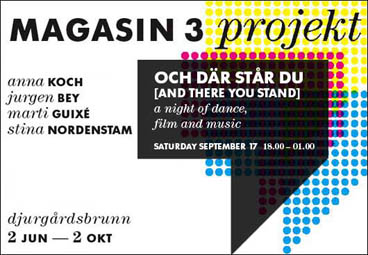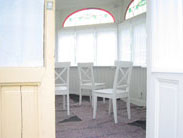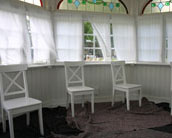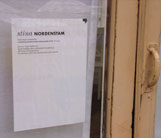 Press Release Press Release
By ?
Published: Magasin 3 Projekt site
Artist, born 1969, lives and works in Stockholm
Stina Nordenstam is best known for her music. Since 1991 she has released
six full-length albums. She has also worked with photography, film and
radio. Stina Nordenstam’s world is characterised by conflicts and
challenges. In a clear and fragile voice, she sings about the darkest
of subjects. The beautiful and the brittle is intermingled with the coarse
and the awkward; vulnerability and violence with the heartfelt.
In the Magasin 3 Projekt gazebo, Stina Nordenstam presents the new sound
installation "Tänk dig en människa" (Imagine a person),
which deals with catastrophes, traumas, UFOs, love and life in general.
We hear the voices of people telling their stories. How much of what they
say is actually true? Documentary narration blends with fiction and newly
composed music.
The work centres round the unique human ability of recovering from traumatic
experiences. Forgetting and fantasizing, fiction and lies play a vital
role. Stina Nordenstam explores human conditions and has chosen to use
some fiction in her representation, congenial with the human condition.
Our minds and memories are creative; they do not simply record. There
are many stories, perhaps mainly in the USA, about people being abducted
by aliens in UFOs. People have given detailed accounts of abuse, which
occasionally have lasted for years.
She created the music for the piece at the same time as she was working
on the texts. There is a common touch that, in Stina Nordenstam’s
words, reflects "the somewhat black-edged joy of being alive, and
the acceptance of the fact that it will not last. It’s like nature
at the time before the school summer holidays: overpoweringly beautiful
but it fades and ends almost before one has time to bat an eyelid."
The documentary in contrast to the fictitious is central to Stina Nordenstam’s
artistic practice. She is located in between these two fields, a striking
example of which is her new work for Magasin 3 Projekt.
A previous autobiographical exploration is her record People Are Strange.
Stina Nordenstam questions the idea that one’s "own" history
makes for more personal or true art. For her record, she reworked and
appropriated several popular songs. She suggests that everyone, despite
one’s point of departure, has to work through layers of recognition
in order to reach an authentic and personal expression. Intuitively, she
seems to work with perhaps the most difficult subject an artist can tackle:
challenging the idea of taste by constantly demanding of the viewer or
listener a reappraisal of the familiar.
Stina Nordenstam has a reputation for being media shy. She seems to be
uncompromisingly rejecting of, or perhaps completely uninterested in,
media exposure. For more than a decade she has declined to give interviews,
appear on television or be photographed. Instead, she circulates her own
images in which she wears wigs and looks different each time.
 Imagine a person Imagine a person
By Stina Nordenstam
Sound installation: Magasin 3 Projekt June 1st 2005
Broadcasted by SR P1 in 'Vita Nätter' May 5th 2006
Translated by hegude
Narrator (Approx. 3 minutes with music)
(Airplane sound)
People seem to need an explanation for everything. For everything they
have experienced. The more weird things, the more effort they make to
find an explanation. Some people even seriously claims that they have
been abducted by UFO:s.
(drums start)
Imagine a place that is totally safe. A secure place. Imagine how it looks
like. Is it indoors or outdoors? Are there any objects there? Maybe some
furniture, or something else to sit on. Imagine how you sit there for
a long time, all by yourself.
(strings start, piano starts)
Then, imagine something else. Take a step back in time. Back to what happened
that made you so scared. Try to remember exactly how it felt. Feel how
scared you are. Feel how it feels in your whole body. Do you notice something
special?
(strings again)
Then, imagine that secure place again. Imagine how you're sitting there,
in the secure place. Sitting quite still in that place.
(Music stops)
Changelings (Approx. 3 minutes, no music)
(Man)
By the time I grew up, I always felt that wherever I came, some smoke
signals had already warned about my arrival. Warned about children that
had been abductued, like I had been. That our presence had always meant
trouble in some way or another. I think it's a fear, and a fear of the
unknown that's behind us, that makes people scared of us.
When I was born as a bastard, my grandfather decided to send my mother
to a boarding school for girls, and that because she shouldn't be aware
of what would happen to me, and the fact that I later on would be handed
over to the aliens.
(Woman)
A passing image of this gray-black stone... A loud sound... And then that
image and then... A fear so deep that it has turned into something else.
But it's not until... By then I never thought about it, It's now, when
I've grown up that I've been thinking about it, what actually happened.
What they did to us and things like that. What's... What it was all about.
Well, I've had a... A real mom. She's dead now, I guess. I was three years
old when I was abducted. And I was away for one year. And then someone
found me in some park and handed me over to the police. And after that
I ended up in the adoption family.
 Narrator (Approx.1.5 minute, no
music) Narrator (Approx.1.5 minute, no
music)
If something happens in a person's life, she will be changed forever.
It doesn't have to be something really serious. Afterwards nothing will
be the same again.
I think it's difficult to tell how you would act in a catastrophe. Like
the Estonia catastrophe, when the ship sank. Crowds of people died. They
didn't have the energy to cling to something. Cling to a life-boat, for
example. (Break) If you imagine how you would react yourself in that situation,
you probably think: I would have clung to something. I would have survived.
You're absolute sure about being one of the survivors. But if you consider
it, what it is that decides if you will survive. If you really consider
it, it's probably not the way you think. If you really consider it, you
might discover that you wouldn't have survived after all.
Changelings (Approx. 1 minute, no music)
(Woman)
Imagine that you're watching paintings on a wall. It's portraits, one
person in every picture. You're wondering if this is a museum. Nobody
would have this many pictures at home. Nobody has this many friends, or
this large family. But there's no text that explains the pictures. No
names, no years, no locations.
(Man)
When you read the last four numbers of my Social Security Number, you
will understand that there's something strange about me. 2021 can't be
the number for a boy in Lapland. It's absolutely impossible. They even
changed the birthday dates for some people, so it wouldn't be possible
to go back and see what had happened.
Narrator (Approx. 3 minutes with music)
(Music starts, rhythms)
Almost everyone who has survived a catastrophe, has something in common.
They all have a feeling of connection. To be part of a context. If you
were from Mars, for example, and landed on earth, and were supposed to
live among the humans, then of course you wouldn't feel any connection.
You wouldn't be able to see how things were connected to each other. Why
you should act in one way, and not in the other. All the time you'd try
to understand the most basic things, that seem obvious to everyone else.
But you have to consider it, every little detail around you, watching
how the others behave, trying to see behavioural patterns in everything,
trying to act like the others. Then you don't have any connection. Then
you're not one of them who would survive a catastrophe.
(Melody starts)
(Rhythms stop) (Strings start)
Now really consider it. Who would survive? Would you survive if there
were a catastrophe?
(Music stops) Changelings
(Approx. 6.5 minutes with music)
(Woman)
Imagine that you're gonna have some friends over for dinner. You're elated.
You're making the house look nice, using your finest china. You're heedfully
laying the table, put some flowers on it. You're feeling excited. Imagine
that it's late the same evening. You're sitting alone at the laid table.
Everything is untouched, they didn't show up.
Imagine how you later on lift up your head and look out through the window,
out in the dark. Suddenly you discern a light. It's approaching, and becomes
lighter. In the next moment, it fills up the whole room.
(Man)
I've experienced how they, a couple of times, have returned to me. But
I haven't felt their interference. One of those experiences is when I'm
up in the mountains with my foster parents, and I'm skiing alone. And
then I find a little brook in a valley. And I'm thirsty and decide to
go down for a drink in the little brook. So I set off, and approach the
brook, that actually isn't a brook, but a water-course to the big Stekenjokk-river.
I arrive and stoop to bring up some water with my cup when everything
burst around me.
(Rhythms start)
And I break through the ice, and I'm quickly swept away with the flow.
And I don't panic, that's the funny thing, I lay there following the flow,
and with my hands I'm touching the rough undersurface of the ice.
(Organ music)
And the sun shines through the ice, and it creates this kind of really
beautiful color spectrum in the ice, and it glitters and shimmers. It's
very beautiful really. And my whole body feels warm, and I become calm,
and I remember I'm thinking that... If dying is this beautiful, then it's
almost worth it.
(Organ plays)
(Strings start)
After this incident, it was just like they had been visiting me, been
touching me. Like they had given me a mission. Like the reason why this
happened to me, was that I should be prepared for the future. Just like
they had returned to remind me, and emphasize what my mission was. That
I was important, That it was important that I stayed alive. That I had
a pronounced mission.
 Changelings (Approx. 3.5 minutes, No music) Changelings (Approx. 3.5 minutes, No music)
('Space' sound)
(Woman)
Our basic assumptions about the world are disturbed. Most of us are building
our lives on three basic assumptions; A) The world is basically a good
place. B) The world is meaningful and possible to calculate, and C) I
am valuable myself.
('Space' sound stops)
(Silence)
I remember one of them who I found so beautiful, but I can't describe
the face in detail, but I just thought that... wow, what a beautiful...
I think it was a she. And she seeked contact with me - That's one of those
scenes I remember. She kept herself in the background. But there is a
violent activity... and it's really tough, and it's in the way for...
but then one of them standing... behind all that activity, there was somebody
standing looking at me. Who expressed... It made me feel calm. And very
sad, because it was... She was so inaccessible. Then, I remember "hard"
and "cold". No fear or... only this violent activity. And then
these unfamiliar surroundings, but I can't... I don't clearly remember...
Yes, steel, I remember steel, but otherwise I don't remember any... It
was very illuminated, as far as I remember. Yah, it was just... I don't
wanna talk about it. It was some strange smell...
(Man)
At certain moments, when I was fighting with my foster parents, there
were always these kinds of words, like: "We should never have taken
you in, due to your origin. We would never, you know, have let you into
our family, with the knowledge we have today. If you, as a child hear
these kinds of words, it creates horrible possibilities for your imagination.
(Muffled space sound)
(Woman)
I was little, and... read comics, it was Donald Duck (laugh), then I was
really scared of being... Suddenly walk those streets, I mean to be swept
into that Comic book, like land up in... on those streets. And without
context and, well, all alone in the whole world.
Narrator (Approx. 1.5 minute, no music)
Your brain is always trying to sort things, so they will end up in the
right place. Some of them are sorted out. They won't disappear forever,
but they will disappear for the moment. That's forgetfulness. (Silence)
Some people seem to be happy all the time. Others angry or grumpy. So
grumpy all the time, that you think: There's that grumpy old lady again.
It seems that a lot of people feels only one feeling, get stuck in it
and turn out to be such a person. But in your entire life, there's maybe
twenty feelings that you're supposed to feel, and you're gonna go through
them, one after the other, until you've felt them all. It's almost like
you were given an mission when you were born. All your life you will walk
around in the world to find the feelings, one after the other. Then, when
you've found the last feeling and felt it, then your mission is completed.
The mission to be a human, and then you're ready to die.
Changelings (Approx. 4 minutes with music)
Man
And then I would like to feel or understand what you remember, if you
remember anything at all. I don't remember my caretaking, do you remember
your caretaking and abduction? Do you remember this place we were taken
to? I was standing within a cage. Where were you placed? And then, maybe
the most important question for me: What makes you breathe today? And
where did you find your strength?
Woman
If I would meet someone who I believed was (Music
starts) like me, someone that had been through the same experiences...
I would ask if he also had been away and returned. And then when we knew
that we both (Guitar starts) had the same
experiences... I think we... I would feel relief, a huge relief, because
I wasn't alone. Because I wasn't unintelligible.
(Strings start)
I would feel really relieved because I knew there was someone else than
just me. And even if I never met him again, I would however know that
they existed.
(Music stops)
Man
Well, I see myself as fragile and vulnerable, really. If you're... The
more open minded you are to life and impressions and the feelings that
surround you, the more fragile and brittle you'll become. But I believe
that man has a capability to recover in all occasions. I believe that
we have got this inside, that we are survivors.
Narrator (Approx. 3.5minutes with
music)
Imagine a person that you like. It doesn't have to be someone you know
so well. Imagine his or her face. Try to imagine it in front of you. Imagine
how he or she is looking at you, straight at you, straight into your eyes,
and you look back for a long time without looking down. Imagine that you
are in a room that this person usually is in. Imagine that you rise to
go, the person also rises, follows you out, walks behind you, down the
stairs and out through the door. Out on the street you walk along each
other without saying anything. The person is walking on your right. You're
walking neither fast nor slow. You're not saying anything, but it's nothing
strange with that. You walk like this for a very long time. You can start
to think about other stuff, anything, while you're walking there. Maybe
you start to think about something horrible. Something you're afraid of
thinking about. But you can always feel the presence of that other person
walking beside you, and then it's not that scary to think about anymore.
Whatever happens in your thoughts, you can always leave it behind, and
feel that you're walking beside him or her. That it's safe, that you're
connected to each other in some way. That you're not alone anymore.

|